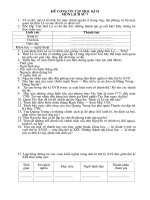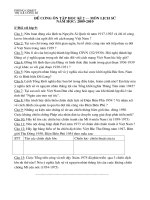Đề Cương ôn tập học kỳ II năm 2009 - 2010 (Môn Anh 9)
Bạn đang xem bản rút gọn của tài liệu. Xem và tải ngay bản đầy đủ của tài liệu tại đây (225.09 KB, 6 trang )
Híng dÉn «n tËp häc kú II
m«n tiÕng Anh.
líp 9
N¨m häc 2009-2010
ĐỀ CƯƠNG ÔN TẬP HỌC KỲ II
Môn: ANH 9
1
Unit 6:
1. Adjectives and adverbs
Adjectives adverbs
Clear
Quick
Soft
Slow
Careful
Fast
Far
Late
Loud
Daily
Weekly
Early
Straight
Good
Clearly
Quickly
Softly
Slowly
Carefully
Fast
Far
Late
Loud / loudly
Daily
Weekly
Early
Straight
Well
Some verbs: be
Seem
Look
Feel + adjective
Taste
Smell
Eg: 1. My aunty is kind
2. She seems happy
3. The food smells wonderful
* Some adjectives have "ly"
Deadly: g©y chÕt ngêi
Friendly: th©n thiÖn
Lovely: dÔ th¬ng
Likely: ch¾c ch¾n
Lonely: c« ®¬n
Lively: sèng ®éng
Silly: ngèc
Ugly: xÊu xÝ
Eg: 4. She spoke softly
5. He runs fast
6. She answered me coldly
7. It is terribly hot today.
8. The little girl was badly treated.
* 9. He looked angry ≠ He looked angrily at me
* 10. Her plan appeared impractical.
* 11. She appeared in the room.
2. Adverbial clause of reason. (as, because, for and since)
2
Because of
Due to ( bởi vì) + noun/ gerund phrase
Owing to
Eg: She got ill because he worked hard
She got ill because of working hard.
Tom didn’t go to the movies due to having seen the film.
* Sự khác nhau giữa Because & Because of:
* …….because + pronoun/ noun + be + adj
*…… because of + poss/the + adj + noun ( tính từ sở hữu)
Eg: This man can’t see well because he’s old
This man can’t see well because of his old age.
1. She is intelligent.
2. You look beautiful in you dress.
3. I feel tired.
4. I have something interesting to tell you.
5. There is nothing new on TV tonight.
6. She is very intelligent.
7. He walked slowly to the park.
8. She laughed (happily, happy, happiness) as she played with her toys.
9. She smiled in a(friends, friendly, friendlily) way.
10. (Because, Because of, Since) his illness, he didn't go to class.
11. She didn't go to the school (when, since, and, therefore) she was sick.
12 I didn't go to the cinema last night because I was tired.
= . Because I was tired, I didn't go to the cinema last night.
13. As he is poor, he can't afford send his children to a good school.
14. He isn't allowed to drive a car since he is too young.
3. Condition sentence (if)
Eg: A: Oh, I have not my keys. Have you seen them?
B: No, I haven't but if I find them, I will tell you.
Unless = if…not (provided that, as long as)
- Unless it rains, we can play tennis. (If it doesn't rain, we can play tennis.)
- Provided you go now, you will not be late for the train.
- As long as you want me to stay, I won't leave you.
Unit 7:
1. Connectives: and, but, because, or, so, therefore, however.
- And( và): dùng thêm thông tin
Eg:His father is a doctor and he works in hospital.
-or( hoặc): diễn tả sự lựa chọn.
Eg: Do you study Maths or Chemistry?
-But(nhưng): nối hai ý tương phản nhau.
Eg: He is fat but his brother isn’t.
-So(do đó, vì thế): diễn tả hậu quả.
Eg: He is busy, so he can’t help you.
- Therefore(do đó) đồng nghĩa với So, chỉ hậu quả.
3
Eg: He is busy; therefore he can’t help you.
*Khác với So: Therefore - có thể theo sau dấu phẩy(,) dấu chấm phẩy(;) hoặc dấu chấm
câu(.)
- However(Tuy nhiên): diễn tả sự tương phản, đồng nghĩa với But, nhưng luôn nối liền
hai mệnh đề.
Eg: He’s over seventy; however, he’s still active.
It’s raining hard; the game is, however, going on.
2. Phrasal verbs:
Turn off, turn on, look for, look after, go on.
Eg: 1. Please turn off the light before going to bed.
2. Would you mind if I turned the TV on?
3. He has been looking for his missing child for years and years.
4. Don't worry about me. I can look after myself.
5. She went on singing on the rain.
6. Why don't you go on with your study?
3. Making suggestions: Suggest + V-ing / Suggest that + S + should +V
Eg: 1. They suggested helping poor people in the city.
2. She suggests (that) we should help poor people in the city.
3. I suggest (that)you should work harder on your pronunciation.
Unit 8-9
1. Relative clauses
1.1. Relative pronouns
Chức
năng
Chỉ
người
Chỉ vật
Chủ ngữ Who Which
Tân ngữ Whom Which
Sở hữu Whose Of which/whose
Eg: 1. I saw the woman. She wrote the book.
I saw the woman who wrote the book.
1. I know the man. You want to meet him.
I know the man whom you want to meet.
3.The pencil is mine. The pencil is on the desk.
The pencil which is on the desk is mine.
4. The dress is beautiful. She is wearing that dress.
The dress which she is wearing is beautiful.
5. The girl is my sister. You took the girl’s picture.
The girl whose picture you took is my sister.
6. He showed me his car. The engine of the car is good.
He showed me his car, the engine of which is good.
* “That” có thể được dùng thay cho Who, Whom, Which
B¾t buéc ph¶i dïng "that" khi nã thay thÕ cho danh tõ cã tÝnh tõ so s¸nh ë bËc nhÊt (the
best, the most interesting… ) everybody, anybody, nobody, somebody, anything,
everything, nothing, something……
Eg: - He is the best teacher that I have ever known.
- I like anyone that lives in the countryside.
1. 2. Relative adverbs. When time Where place
* Eg: 1. Monday is the day. We will come then.
4
Monday is the day when we will come.
2. I never forget the village. I was born there.
I never forget the village where I was born.
1.3. Defining and non-defining relative clause.
Eg: 1. The woman who sang here last night has gone away. (Defining clause)
2. My father, who is a tailor, is interested in fashion. (Non-defining clause)
B. Bài tập.
Kết hợp những câu sau dùng đại từ quan hệ.
1. Alice is my friend. Alice’s mother died last year.
2.The boy will be punished. He threw that stone.
3. Ann is very friendly. She lives next door.
4.The man is a famous actor. You met him at the party last night.
5.There are some words. They are very difficult to translate.
6.I was looking for a book this morning. I’ve found it now.
7.Is that the car? You want to buy it.
8.Sandra works in advertising. You were talking to her.
9.The little girl ate sweets the whole way. She sat next to me on the coach.
10.Lan is a journalist. Her tape recorder was stolen.
11.I don’t know the name of the woman. I spoke to her on the phone.
12. We often go to visit our friends in Bristol. It’s only 30 miles away.
13. This is Mr. Carter. I was telling you about him.
14. That is the room. The meeting is held in that room.
15. I’ll always remember the day. I first saw that sight on that day.
16.She was born in Malaysia. Rubber trees grow well there.
17.No one knows the school. My uncle taught at that school 10 years ago.
18. Please ask them the time. The train stared the trip at that time.
19. New Year’s Day is a day. All family members gather and enjoy a family dinner then.
20. There are many hotels. Tourists can enjoy their holidays there.
21.India is a country. The earthquake occurred in this country last month.
22. Bac giang is a city. I was born and grew up there.
23. We have not decided the day. We’ll go to London on that day.
24. The man made me sad the most. I love him with all my heart.
25.The thief was caught. This was a really good news.
26. The gentleman was very young. He was introduced as the most successful businessman.
27. His book became the best seller. It was punished last year.
28. Neil Armstrong lived in the USA. He walked on the moon.
29. Nam is very intelligent. He learns in our class.
30. Ha Long has grown into a big city over the past few years. I visited the city last year.
Keys.
1.Alice, whose mother died last year, is my friend.
2.The boy who threw that stone will punished.
3. Ann, who lives next door, is very friendly.
4.The man who/ that you met at the party last night is a famous actor.
5.There are some words that/ which are very difficult to translate.
6.I’ve found the book that/which I was looking for this morning.
7.Is that the car that/ which you want to buy?
5
8.Sandra, who you were talking to, works in advertising.
9.The little girl who/ that sat next to me on the coach ate sweets the whole way.
10.Lan, whose tape recorder was stolen, is a journalist.
11. I don’t know the name of the woman who/ that I spoke to on the phone.
12. We often go to visit our friends in Bristol, which is only 30 miles away.
13. This is Mr. Carter, who I was telling you about.
14. That is the room where the meeting is held.
15. I’ll always remember the day when I first saw that sight.
16. She was born in Malaysia, where rubber trees grow well.
17.No one knows the school where my uncle taught 10 years ago.
18. Please ask them the time when the train stared the trip.
19. New Year’s Day is the day when all family members gather and enjoy a family dinner.
20. There are many hotels where tourists can enjoy their holidays.
21.India is the country where we the earthquake occurred last month.
22. Bac Giang is the city where I was born and grew up.
23. We have not decided the day when we’ll go to London.
24.The man whom I love with all my heart made me sad the most.
25. The thief was caught, that was a really good news.
26. The gentleman who was introduced as the most successful businessman was very
young.
27. His book, which was punished last year, became the best seller.
28. Neil Armstrong, who walked on the moon, lived in the USA.
30. Ha Long, which I visited last week, has grown into a big over the past few years.
2. Adverbial clause of concession:
Though, although, even though even if, despite, in spite of, however, whatever
a. Although
Though
Even though + clause
Even if
Eg: - Although / Though it rained heavily, they went out with their friends.
Even if you don't like me, I will be here with you.
- Despite the bad weather, they continued climbing the mountain.
- In spite of her illness, she tried her best to complete the assignment.
6









